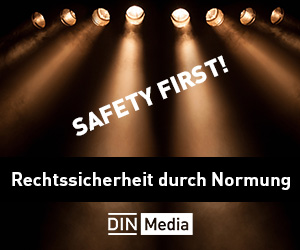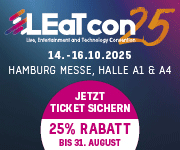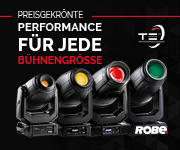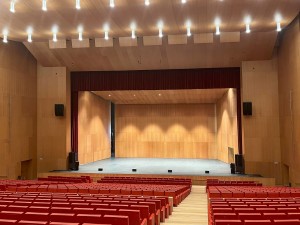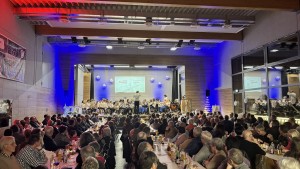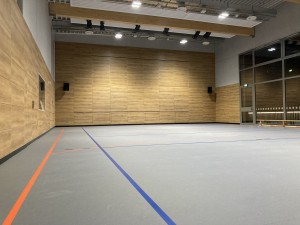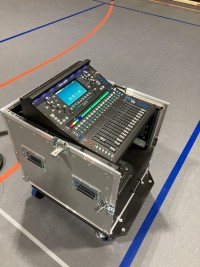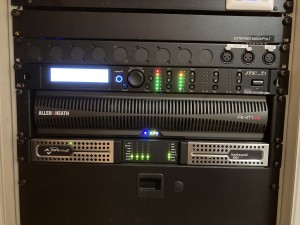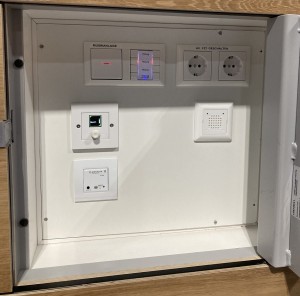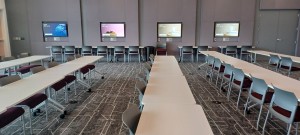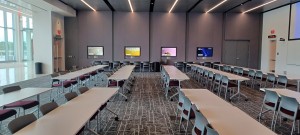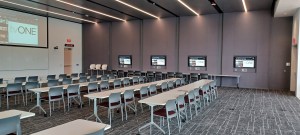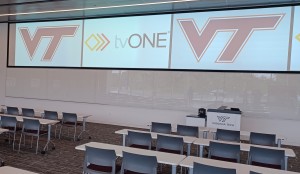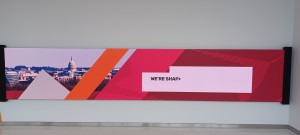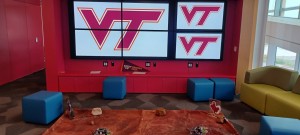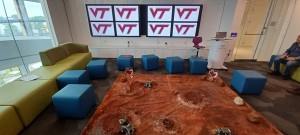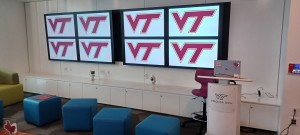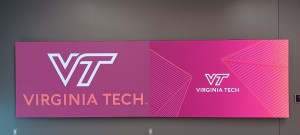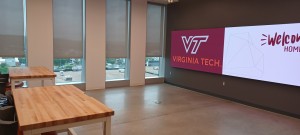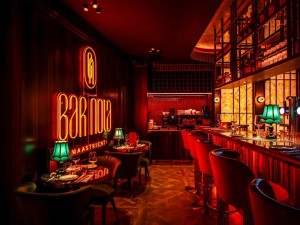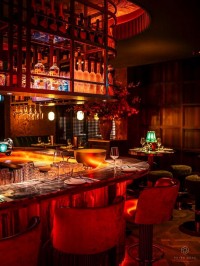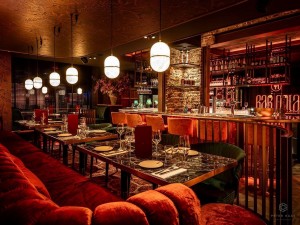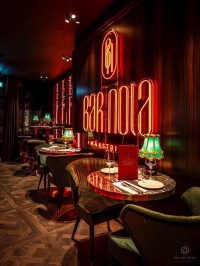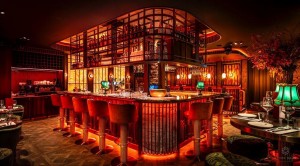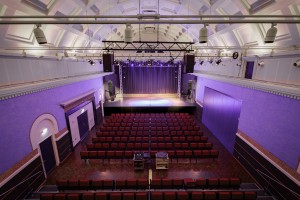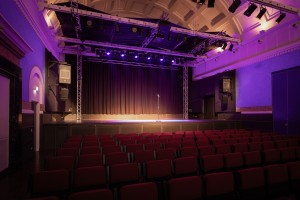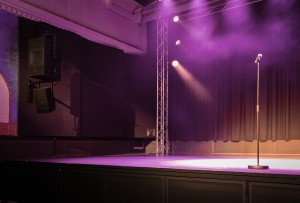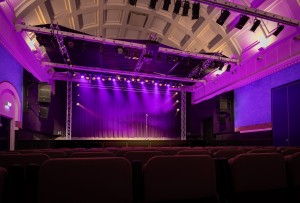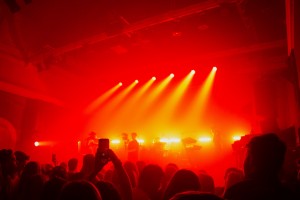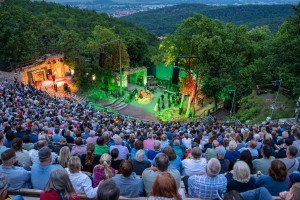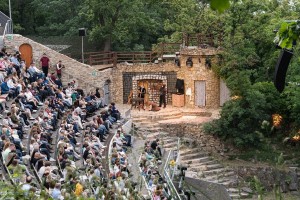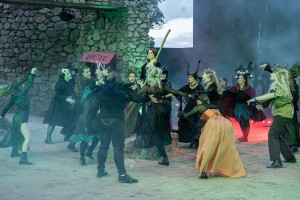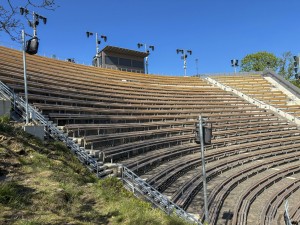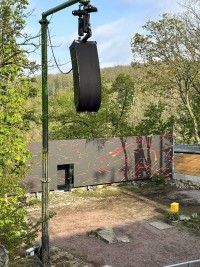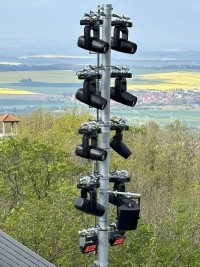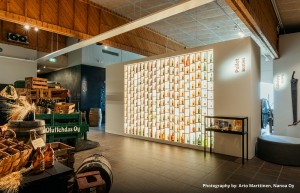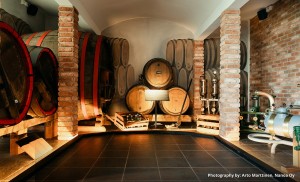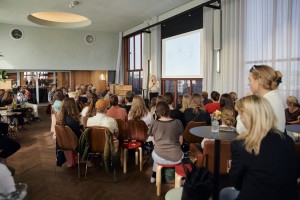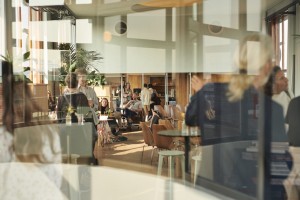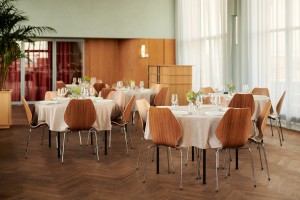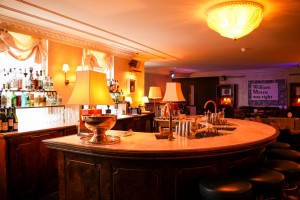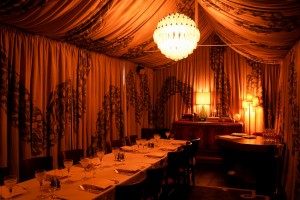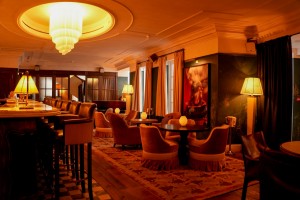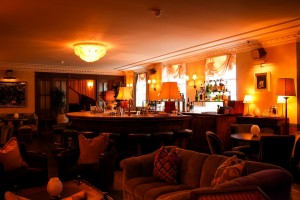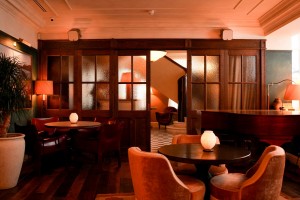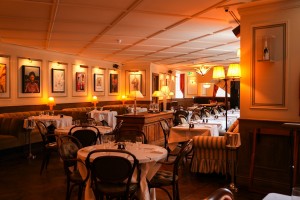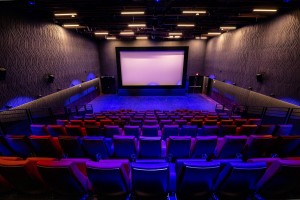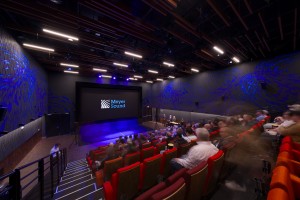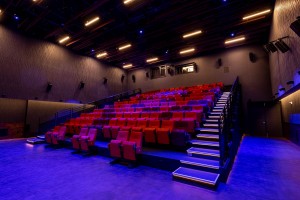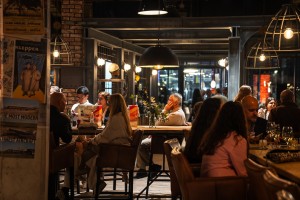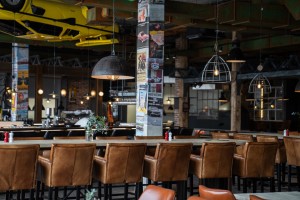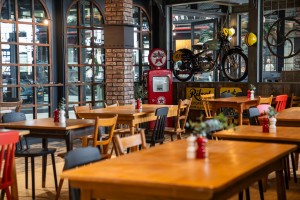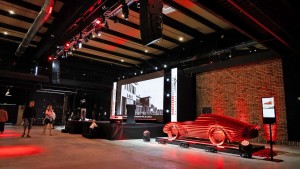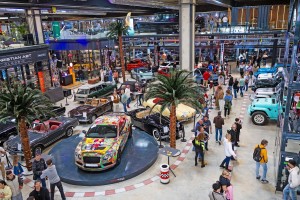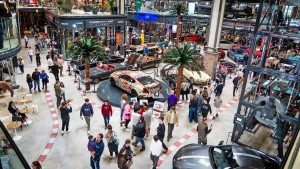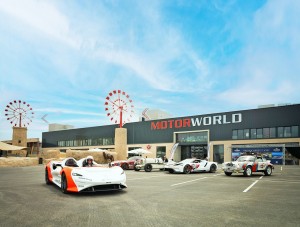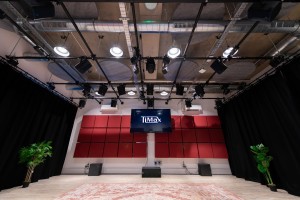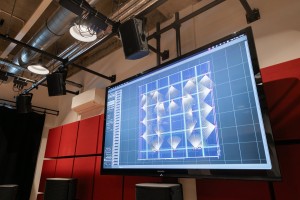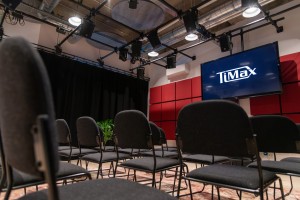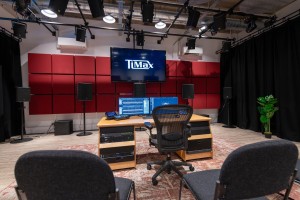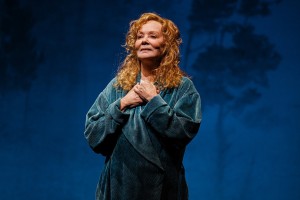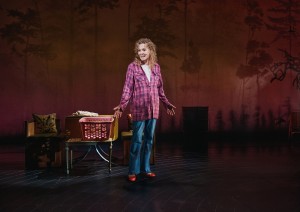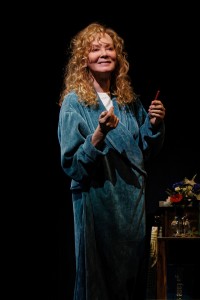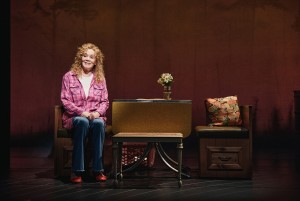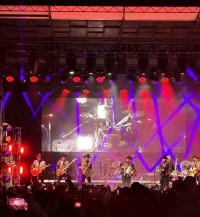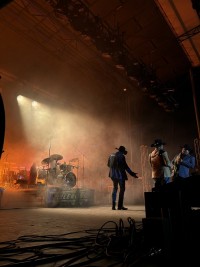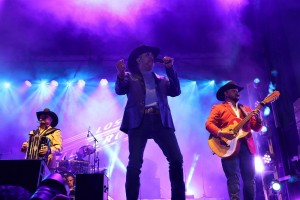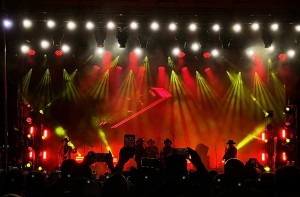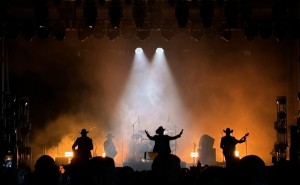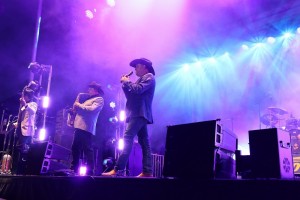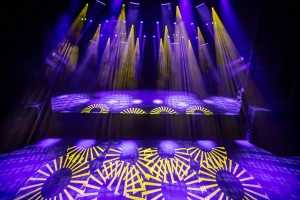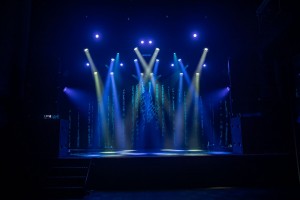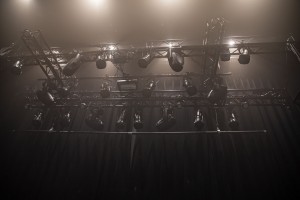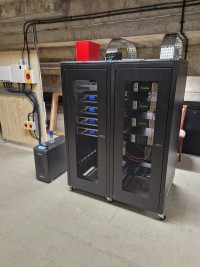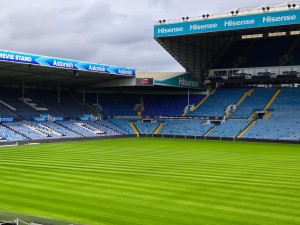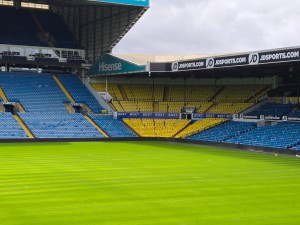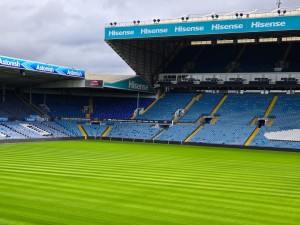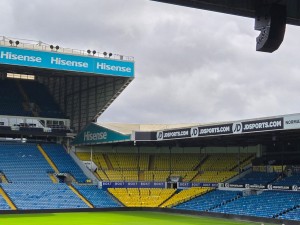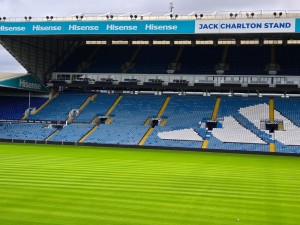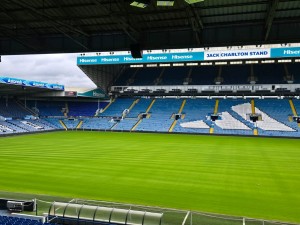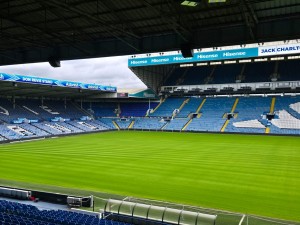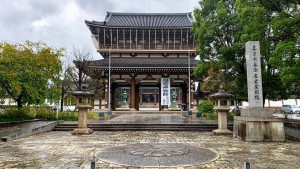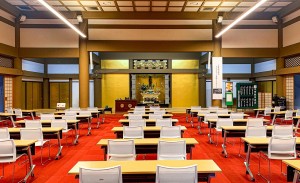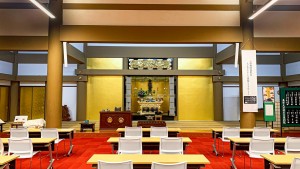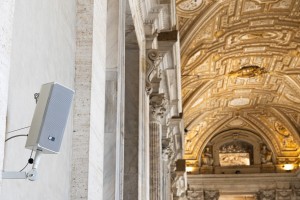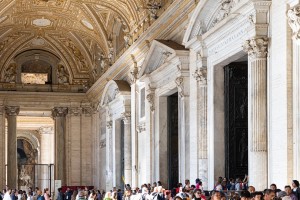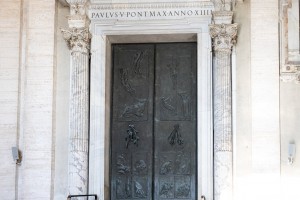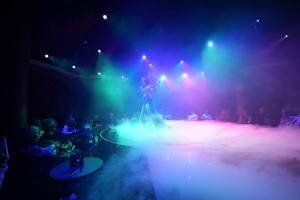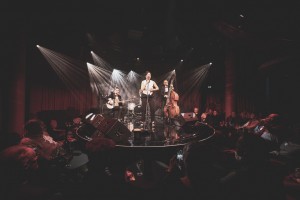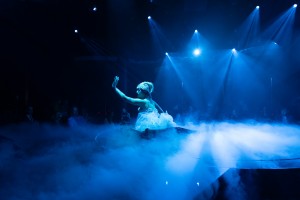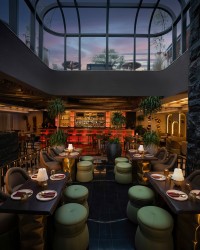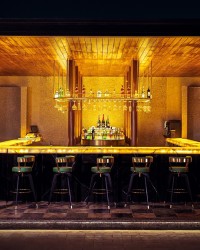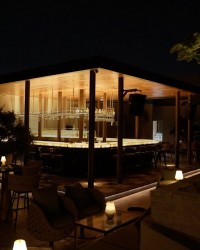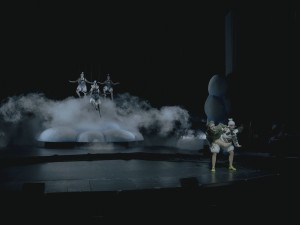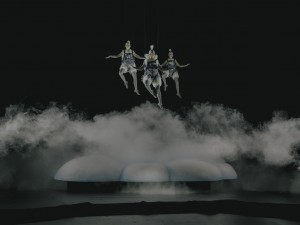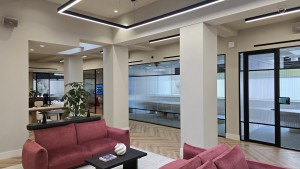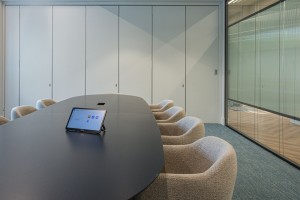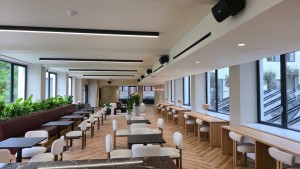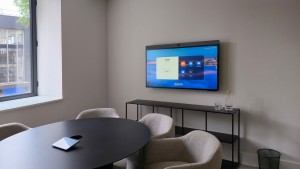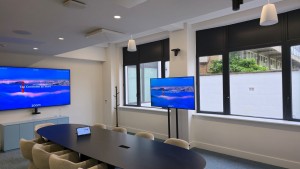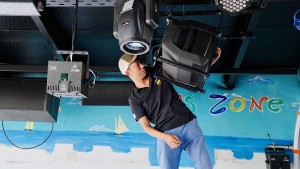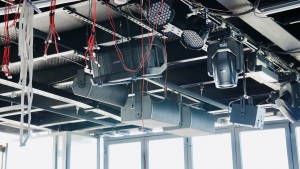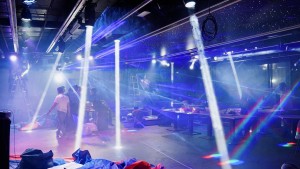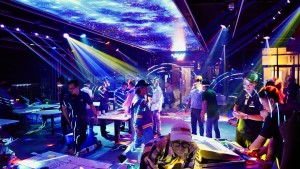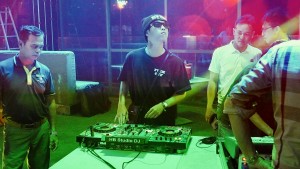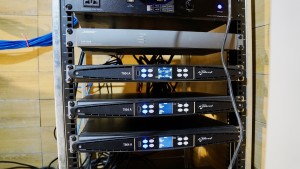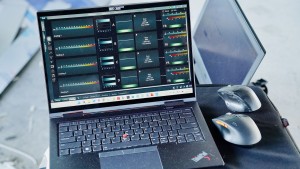Installationen News
Installationen News Schlagzeilen
Verjans AV designs and supplies Coda Audio systems for three Maastricht city-centre venues
17/07/2025
Cpunt invests in Robe
27/06/2025
L-Acoustics L2D arrays solve 40-metre coverage challenge at Baluarte Congress Palace
The 1,600-seat main auditorium of Pamplona, Spain’s Teatro Baluarte presented a classic audio challenge: achieving consistent coverage across forty metres of depth without delay systems, while accommodating programming that ranges from classical orchestras to contemporary rock concerts. The venue’s reverberant acoustics and requirement for clean stage presentation - essential for flamenco and classical performances - demanded a solution that could deliver professional touring-grade audio within strict aesthetic constraints.
Baluarte Congress Palace, adjacent to Pamplona’s 16th-century Citadel, serves as Navarra’s primary cultural venue with 63,000 square metres of conference and performance space. The main auditorium’s acoustic properties and diverse programming schedule - from Madrid pop-rock band Morgan to violinist Ara Malikian - required a system capable of handling vastly different sonic requirements while maintaining intelligibility throughout the space. Earpro, the L-Acoustics distribution partner in Spain, worked with the L-Acoustics Application team to design a solution centred on L2D line arrays. The integration was carried out by Telesonic, a Spanish company that designs and integrates audiovisual installations.
The system’s integrated cardioid technology proved essential for controlling acoustics in the reverberant space, while the compact form factor met the venue’s stage aesthetic requirements. The venue’s previous positive experiences with L-Acoustics rental systems, including Kara II, established familiarity with the brand’s capabilities. However, the L2D selection was driven by additional criteria beyond sonic performance. As part of Baluarte’s Strategic Project 23-30, with its focus on digitalisation and sustainability pillars, the venue prioritised environmentally responsible technology alongside audio excellence.
“The installation of the L2D also represents an important step forward in our environmental commitment, as we are talking about an extraordinarily efficient and environmentally friendly system”, states Eduardo Nanclares, Director of Sustainability and Quality at Nicdo and Head of Operations at Baluarte. The L-Series’ sustainable design credentials - requiring thirty percent less wood and sixty percent less steel, using fifty-six percent less paint, and being twenty-five percent lighter than comparable systems - aligned with the venue’s green design philosophy. An on-site demonstration confirmed that the L2D configuration could deliver professional-grade coverage while meeting budget parameters, spatial constraints and sustainability objectives.
Digital acoustic modelling through Soundvision software addressed the project’s primary technical obstacles: achieving consistent SPL across the venue’s 40-metre depth without delay systems; balancing direct sound projection with room reflection management in the highly reverberant space; and maintaining adequate sound levels to back seating areas while preserving sight lines and blending into the architecture. Multiple configurations were analysed before the final L2D solution proved optimal for the venue’s specific acoustic and operational requirements.
The main system comprises L/R arrays of one L2D per side, configured in supercardioid mode to maximise on-stage rejection, with Panflex angles set to 90-degrees, angled inward to minimise side wall reflections. Low-frequency reinforcement comes from a centre-hung array of six KS21 subwoofers arranged in two hangs of three units each in a cardioid configuration. These can be reconfigured as left-right subwoofer stacks for specific concert requirements.
Four X8 across the stage lip serve as front-fill, while four X12 are ground-stacked at stage left and right for in-fill. The entire system operates over Milan-AVB, with a P1 processor managing the network connection between front-of-house consoles and the LA7.16i amplified controllers housed in the venue’s rack room.
(Photo: EarPro/L-Acoustics/Teatro Baluarte)
Bürgerhaus Leinstetten nutzt Lösungen von Allen & Heath
Im Bürgerhaus Leinstetten finden unterschiedlichste Arten von Veranstaltungen statt. Diese Vielseitigkeit stellt eine Herausforderung an das eingesetzte System dar, welches neben professionellen Anwendern wie Tontechnikern auch für technisch weniger versierte Gastgeber handhabbar sein sollte. Zudem sollten Foyer und Halle sowohl unabhängig voneinander als auch gemeinsam bespielbar sein. Um diesen Anforderungen gerecht zu werden, wählte das zuständige Unternehmen, Bronner Audio, Lösungen von Allen & Heath.
Damit Foyer und Halle unabhängig voneinander bespielt werden können, kommt der Audio-Matrix-Prozessor AHM-64 mit flexiblen Routing- und Signalverarbeitungsmöglichkeiten zum Einsatz. Um auch für größere Veranstaltungen gewappnet zu sein, wurde die Konfiguration zusätzlich um einen AR84-Expander sowie ein SQ-5-Digitalmischpult erweitert.
„Das SQ-5 kann in der Halle eingesteckt werden und verbindet sich über S-Link mit dem AHM-64 und dem AR84“, erklärt Martin Bronner, Geschäftsführer von Bronner Audio. „Die Signale der Funkmikrofone werden dann vom AHM-64 an das Pult geschickt, wo die eigentliche Signalbearbeitung stattfindet.“
Um die Handhabung des Systems zu vereinfachen, wurden zwei IP1-Rotary-Wallplate-Controller verbaut, einer in der Halle und einer im Foyer. Darüber lassen sich die grundlegenden Funktionen anhand eines Drehreglers steuern. Für kleinere Veranstaltungen wird ein CC-Touch-Panel genutzt.
(Fotos: Martin Bronner)
Virginia Tech equipped with TVOne Coriomaster
An installation of TVOne Coriomaster video processors at the Virginia Tech State University has transformed how students learn, and lessons are taught. Four distinct areas within the institution’s Alexandria campus now feature LED screens, projections or displays driven by a range of Coriomaster2, Coriomaster Mini, and Coriomaster Micro units. The project is part of a wider upgrade of projector screens, LED video walls and TVs.
Virginia Tech’s AB1 AV Manager Diego Romero worked closely with TVOne’s Mid-Atlantic Regional Sales Manager Mitch Klein to find solutions for all four spaces at the Alexandria campus’ Academic Building One. This building includes 300,000 square feet of academic space and research and development facilities, across eleven floors.
“The overall aim was to provide users with a smooth experience when sharing their content on displays that have non-standard aspect ratios and where multiple pieces of content could be shown at the same time”, explains Romero. “Prior experience with TVOne in other installations led us to selecting the company again.” The four areas that were the focus of the installation are the AI & Machine Learning Lab, the Boeing Auditorium, the K-12 Gaming Lab, and the Lobby video wall.
“In the AI & Machine Learning Lab, we installed a TVOne Coriomaster Micro, opting for a Coriomaster Mini in the Boeing Auditorium”, furthers Romero. “We specified a Coriomaster2 in the K-12 Gaming Lab and a second Coriomaster Micro to cover the Lobby video wall. Each of the devices provides the right amount of processing and features. For example, AI & Machine Learning Lab and Lobby video wall are basic applications with a small number of inputs/outputs, meaning that the Coriomaster Micro was just enough for those spaces.”
Inside the AI & Machine Learning Lab, LED video walls allow users to share content from a laptop while comparing results of AI or ML models that are being generated by a more powerful computer, side by side. Over in the Boeing Auditorium, users can use five windows for content on a 60-foot-wide projection screen and select the content for each window individually.
At the K-12 Gaming Lab, users can drive a six-display video wall or display one large image spanning four different displays, as well as break up the image being displayed on the 98’’ displays into four smaller windows. Down in the Lobby, the video wall is a display where the marketing team can create and play content on a non-standard aspect ratio, as well as use it for regular digital signage and presentations when needed.
“Most of the initial setup and programming was done by our main programmer, and I fine-tuned the devices to match what we wanted to see on the screens”, adds Romero. AVI-SPL supplied the TVOne equipment for AI&ML, Boeing, and Lobby video wall. RTW supplied the Coriomaster 2 in the K-12 Gaming Lab.
“We mainly focus on using different layouts and recalling them depending on the desired use case for that moment”, concludes Romero. “Once we figured out how the windows in the Coriomaster interacted with the general output of the system, it was a matter of just lining them all up with fine corrections. This made the process of aligning and setting up all the images for the K-12 Gaming Lab a much smoother process.”
(Photos: TVOne)
Verjans AV designs and supplies Coda Audio systems for three Maastricht city-centre venues
In the Dutch city of Maastricht, integrator Verjans AV, specialists in the hospitality sector, recently designed and supplied Coda Audio systems for three city-centre venues. Harald Verjans, customer of Viladco, Coda’s Benelux distributor, first encountered Coda Audio in 2013 and has been using the brand ever since. “The fact that all the different cabinets share the same sonic signature is a big plus”, he notes.
Verjans installed a new Coda Audio system for the recently opened “Bar Nola”. The management at this restaurant and bar wanted audio from a discreet professional-grade system which matched the ambience of its interior. The system comprises eight Coda Audio Hops5 (compact two-way double 5’’ high-output point source) with two Coda Audio U12 subs.
Next door at “Cafe Van Bommel”, a cafe bar which has been a feature of Maastricht’s nightlife for more than thirty years, Verjans upgraded to a Coda system featuring six Hops8i (double 8’’) with two G715-Pro (three-way, full range 15’’).
Completing the trio of installs was nearby “Club Roto”, a late-night bar and club featuring DJ sets, where twelve Coda Audio G712 (three-way, full range 12’’) were installed alongside two G15-Sub sub extensions. All three installations are powered by Coda Audio’s Linus DSP amplifiers.
(Photos: Peter Baas Photography)
Slagelse Musikhus mit Meyer Sound Ultra-X80 und 2100-LFC modernisiert
Das Slagelse Musikhus im Westen Dänemarks wurde kürzlich als einer der ersten Veranstaltungsorte weltweit mit dem neuen Ultra-X80-System von Meyer Sound ausgestattet. Seither sorgen die neuen Point-Source-Lautsprecher in Kombination mit 2100-LFC-Low-Frequency-Control-Elementen für einen dynamischen Sound und eine Erweiterung im Tieftonbereich.
Bei einer Produktdemonstration vor Ort durch das dänische AV-Integrations- und Beratungsunternehmen Stouenborg hörte das Team des Slagelse Musikhus das System zum ersten Mal. Die Vorführung erwies sich als ausschlaggebend für den Zuschlag, so Projektleiter Anders Jørgensen: „Das Team war schon seit Jahren auf der Suche nach dem richtigen Ersatz für das in die Jahre gekommene System im Haus. Nach der Demo war klar: Das ist die perfekte Lösung.“
Søren Siig, Technischer Leiter und Hauptsystemtechniker im Slagelse Musikhus, ergänzt: „Unser altes System war fast 25 Jahre alt, und wir konnten dafür keine Ersatzteile mehr bekommen. Als wir die Ultra-X80 und den 2100-LFC zusammen hörten, wussten wir, dass unsere Suche ein erfolgreiches Ende hatte.“
Die Installation beinhaltet zwei Ultra-X80 und vier 2100-LFC sowie Ultra-X40-, UPJ-1P- und Ultra-X20-Lautsprecher und wird über eine gemeinsame Galileo-Galaxy-Netzwerkplattform gesteuert. „Mit den Ultra-X80 und einem kleinen Unterhang aus Ultra-X40 konnten wir viel Platz auf der Bühne schaffen“, sagt Jørgensen. „Das alte System benötigte anderthalb Meter auf jeder Seite - das neue nimmt deutlich weniger Platz ein.“ Jetzt sei „mehr von allem da“, fügt Siig hinzu: „Die Mitten sind kräftiger, die Dynamik ist besser, und das System ist extrem transparent. Und die 2100-LFC liefern eine ganze Suboktave mehr als die Bässe vorher.“
Die erweiterte Wiedergabe im Tieftonbereich mache den Veranstaltungsort auch attraktiver für zeitgenössische Genres, insbesondere Hip-Hop und elektronische Musik. „Heutzutage mischen Künstler anders als noch vor zwanzig Jahren - sie wollen mehr Bass“, so Siig. „Ab sofort können wir das liefern, ohne an unsere Grenzen zu stoßen.“
Das gesamte System ist über ein AVB-Milan-Netzwerk verbunden und wird über die Meyer-Sound-Nebra-Softwareplattform überwacht, effizient und skalierbar. „Lange hatten wir keine Möglichkeit, Produktionen in Echtzeit zu überwachen“, erklärt Siig. „Jetzt können wir den Zustand des Systems zu jeder Zeit prüfen, einschließlich der Messung von Temperaturen, Spannungen und Limiting - und bei Bedarf auch während einer Show darauf reagieren, anstatt Dinge im Nachhinein zu reparieren.“
Das Slagelse Musikhus wurde ursprünglich 1909 als Kraftwerk in Betrieb genommen. Nach einer umfassenden Restaurierung wurde es 1995 als Eventlocation wiedereröffnet. Seither bietet der Konzertsaal mit seinen hohen Decken, Rundbogenfenstern und Elementen aus der Zeit der industriellen Nutzung Platz für ein vielfältiges Programm aus Konzerten und Kulturveranstaltungen.
(Fotos: Nalle Magnusson/Oscar Siig)
L-Acoustics L Series chosen for Historic Harzer Bergtheater
Perched 454 meters high in Germany’s Harz Mountains, the historic Harzer Bergtheater is an open-air cultural landmark facing extraordinary operational challenges due to its exposed mountain environment. Following a five-year renovation, the venue’s new management aimed to attract high-calibre performers and expand their summer programming, requiring a professional sound solution to replace previous rental systems.
The venue presented two formidable obstacles: extraordinarily steep audience seating demanding precise coverage, and strict safety regulations requiring complete removal of the main sound system nightly due to unpredictable mountain weather conditions. “The venue presents a truly unique situation”, confirms Alexander Schad, CEO of Session Pro GmbH, L-Acoustics Certified Partner, who collaborated with consultant Matthias Kreiner and Bodo Bergmann on the project.
Planning commenced some three years ago, with the team initially evaluating various professional sound system options. The launch of L-Acoustics’ L Series provided the breakthrough solution they needed. “The L Series provides superior vertical coverage control for the distinctive topography while allowing for rapid deployment and derigging - essential capabilities for this venue”, says Schad.
Soundvision software played a crucial role in overcoming the venue’s challenges. “We couldn’t rely on standard deployment approaches”, continues Schad. “The extreme slope creates sound propagation scenarios you rarely encounter in conventional venues. Soundvision allowed us to model precisely how sound would travel through the space and determine optimal placement for each component, particularly the X12 delay and surround speakers needed to ensure even coverage from front row to the uppermost seats.”
The result is a versatile configuration featuring L/R hangs of one L2 over one L2D. The L2D, with its 60° of vertical control and progressive horizontal coverage from 110° to 140°, proved ideal for the steep audience areas. This main system is complemented by six ground-stacked KS28 subwoofers, three per side. Fourteen X12 speakers are strategically positioned - four each side and six at the back of the tiered seating area to provide comprehensive coverage throughout the entire seating area.
The most distinctive aspect of this installation is the custom-engineered steel arm construction designed specifically for this venue. “We designed a specialised rigging solution allowing the technical team to safely install and remove the main L2 arrays daily within a tight operational window”, explains Session Pro Sales Manager Holger Kügelgen. “The L Series waterproof covering provides protection during performances, while its rigging design facilitates quick turnaround - critical during the busy summer season.”
The new system has immediately enhanced the historic theatre’s capacity to attract high-calibre artists - a key motivation for the investment. “We chose L-Acoustics because it delivers even, reliable sound coverage throughout the entire Harzer Bergtheater while remaining versatile enough for concerts, musicals, and theatre performances for years to come”, says Jerome Querfurth, event technicial at Harzer Bertheater.
(Photos: Carsten Kammer/L-Acoustics)
Genelec supports immersive audio installation at Olvi Brewery Museum
The Olvi Foundation Brewery Museum offers an opportunity to delve into the history and traditions of Finnish beer brewing. Located in Iisalmi - also the home of loudspeaker manufacturer Genelec - this is Finland’s only brewery museum open to the public.
At its heart is a new immersive installation titled “The Spirit of Olvi”. Built into a custom-designed five-sided space, it invites visitors into a multi-sensory experience that uses light, image, vibration, and spatial sound to explore the 145-year history of Finland’s last major independent brewery. The system behind it is entirely bespoke, and is powered by a Genelec loudspeaker setup.
Janne Lankinen, COO of Finnish integrator 4business, led the technical design of the museum alongside creative partners OiOi Collective. “From the start, this was a very collaborative process”, he explains. “OiOi developed the script, the visual concepts, and soundscapes, while we looked after the technical infrastructure. We collaborated from the outset with all the other contractors involved, to ensure the technology was fully integrated with the architecture of the space.”
“Because we largely used Genelec’s Smart IP active loudspeakers for this project, we could power everything over a single network cable - no external amps, no extra signal or power cabling. That helped streamline the installation and future-proof the system”, he adds.
The Smart IP models - including the 4420, 4430, and 4436 pendant loudspeakers - feature prominently throughout the museum. In the immersive space, which offers a 180-degree visual experience across a five-sided asymmetrical display surface, 4business also installed five AIW26 in-wall loudspeakers at the centre of each screen segment, supported by eight 4430s distributed across the sides, rear and ceiling, and a tightly controlled array of four 5041 in-wall subwoofers behind the screens.
“The space is designed so that each screen can deliver its own content independently”, continues Lankinen. “This was a challenge in terms of loudspeaker placement, as the dialogue needed to remain localised to the source and still sound natural, regardless of the position of the listener. We also had to control the low end carefully, especially given the asymmetrical shape of the room. We used an arc array of subs to ensure smooth low frequency coverage throughout the space.”
Four Clark Synthesis tactile transducers synced to the soundtrack are hidden beneath the floor, adding a physical dimension to what people are hearing. “We’ve had people gasp or smile when they realize they’re actually feeling the sound through their feet”, says Aki Päivärinne of OiOi Collective, who led the sound design. “It’s subtle, but it adds a layer of realism that really stays with you.”
Rather than rely on pre-existing spatial audio formats, each room in the museum was scored and mixed independently, with discrete playback channels for each loudspeaker. “We’re not using Atmos or anything like that”, notes Lankinen. “This is custom multichannel audio for each space. The 4business team built the playback systems to handle all of that, and made sure it was intuitive to use.”
As an unmanned, self-service museum, the entire system must run unattended throughout the day. “Thanks to modern technology and automation, more and more smaller museums are now unmanned”, details Lankinen. “In the morning, the restaurant staff power everything up with a single touch on a control screen. Visitors then select their experience via a touchscreen, whether it’s a film or a brewery tour, and the system automatically adjusts all volume levels, content, and even the lighting. It’s completely hands-off.”
Outside the immersive room, the museum continues to explore audio storytelling in creative ways. The raw materials exhibit features six Genelec 4420 Smart IP loudspeakers and two 7350 studio subwoofers, reproducing atmospheric audio that evokes the textures and smells of brewing ingredients. In the cellar area, another four 4420s deliver what Lankinen calls “a surreal soundscape - as if you’re hearing the fermentation process from inside the barrel”.
Perhaps the most technically complex section is the “Symphony of the Machines”, a kinetic audiovisual installation built entirely from recordings of Olvi’s factory equipment. Eight 4420 loudspeakers and two 7350 subwoofers form a surround system that gives rhythmic life to the clanks, clicks, and hiss of the brewery’s industrial side. All audio was custom-mixed.
“In a project like this, the quality of the loudspeaker really matters”, notes Päivärinne. “Because when it works, people don’t notice the technology at all. They’re absorbed in the story. That’s the goal.” For the Olvi Foundation, the result is a dramatic transformation of what was previously a static, outdated museum. “We had a thirty-year-old exhibition in a space that people found dark and gloomy”, says Mervi Toivainen, the Foundation’s representative. “This new version invites you in. The space is modern, but not cold - it feels alive.”
(Photos: Arto Marttinen/Nanoa Oy)
Benum selects Renkus-Heinz’s IC Live Gen5 Series for reimagined event space in Oslo
Perched atop the historic Folketeater Building in Oslo, Norway, Byens Tak is a twelfth-floor event space that offers panoramic views of the cityscape, fjords, and surrounding forests. The venue, which hosts everything from corporate events and conferences to concerts, club nights, and private celebrations, has been equipped with Renkus-Heinz audio solutions.
Byens Tak’s architectural heritage presented a set of challenges for audio installation. With its long, narrow layout and intricate acoustics, which includes two large domes originally designed for natural sound amplification, ensuring even sound coverage without intrusive equipment was a critical requirement.
“The whole space is protected, so we had to work around the existing architecture”, notes Daniel Glaister from Benum, Renkus-Heinz’s distributor in Norway. “The client wanted the speakers to be as integrated and as invisible as possible.” Additionally, the audio system needed to cater to vastly different applications. In the daytime, the venue functions as a co-working space and hosts professional meetings; by night, it transforms into an atmospheric bar and club, demanding immersive sound for DJ sets and live performances.
To meet the venue’s diverse needs, Benum specified a system featuring two Renkus-Heinz IC Live Gen5 digitally steerable column arrays, permanently mounted on the long wall. These were complemented by two Renkus-Heinz SA118 subwoofers, which are mobile on wheels for flexibility.
“We could color-match the IC Live Gen5 models to the venue’s walls, making them almost invisible”, says Glaister. “With beam steering, we could direct the sound exactly where it needed to be, avoiding problem areas and ensuring speech clarity as well as high-energy sound for DJ performances.” Additionally, the placement of the subwoofers - one on each side of the room rather than in traditional stereo alignment - allows for even low-frequency distribution.
(Photos: Anne Valeur)
Tateside installs 1 Sound across Soho Mews House members’ club
The latest iteration of the Soho House members club experience, Soho Mews House, promises a next-level of exclusivity with membership extended to only the most long-standing of the brand’s patrons on an invite-only basis. Designed with a more refined and mature atmosphere in mind, the new Mayfair club reimagines the early days of the Soho House brand.
Opened in October 2024, the launch party brought together a guestlist spanning from James Corden to Stanley Tucci and Olivia Coleman, with invitees serenaded by Nick Cave. London-based integrators Tateside led the AV integration at the new premises, strengthening their already long-standing relationship as a technology partner of Soho House across all its sites in the capital.
“We were approached with a design-led brief to install an audio system to match the interiors of new Mews House”, explains Jack Cornish, Technical Director at Tateside. “We felt that 1 Sound was a perfect match for this, so we designed a system based around their custom-finished loudspeakers.” The project comprised audio across the ground, first and second floors, including the reception area, the Piano Bar, a main dining room and a live performance space, the Half Moon Bar. 1 Sound’s wood-stained finished and custom-coloured loudspeakers fit the bill when it came to ensuring the interiors remained undisturbed.
In the Piano Bar, which has already hosted the likes of Jools Holland and Macy Gray, Tateside opted for 1 Sound’s C6 loudspeakers and WSub45s which are used for both acoustic Piano and DJ performances. The Piano was fitted with DPA microphones. To keep things simple, a Skaarhoj motorised fader bank was installed, allowing for basic microphone control without a bulky mixing desk or the need for a sound tech on site. 1 Sound monitors in a matching wood stain finish are placed on the piano and the DJ booth.
Upstairs in the main dining room, Tateside opted for 1 Sound’s compact C4 coaxial loudspeakers and MiniSub5 subwoofers, the latter of which were installed under banquette seats. “In the private dining room, MiniSub5s were positioned above the draped fabric ceilings, allowing us to integrate audio with a small footprint and minimal visual impact”, says Cornish.
Finally, the Half Moon Bar, a live performance area on the second floor, is equipped with 1 Sound’s Tower column cardioid loudspeaker systems, complemented by further C6 units and WSub45 wall subs. Wood stain and cream finishes continue the interior theme, whilst the cardioid pattern of the column systems is effective at controlling noise on the stage in such a tight space, boasting -20 dB rear attenuation. “In the performance space, the loudspeakers are clearly on display, but still integrate nicely thanks to custom finishes”, says Cornish. “The wood stain matches the joinery, so they naturally look the part.”
Furthermore, due to the Q-Sys control backend, the rooms support multiple modes, switching from DJ mode to live performance mode, which includes audio EQ and automatic time alignment shifting. DMX show lighting is tied in through Q-Sys, with control via an Apple iPad or simplified switching via Pragma wall panels on each floor.
(Photos: Tateside/Soho Mews House)
Beverly Theater Las Vegas installiert Meyer-Sound-Astrya-System
Das Beverly Theater in Las Vegas ist kürzlich als weltweit erster kommerzieller Veranstaltungsort mit Astrya-140-Kinolautsprechersystemen von Meyer Sound ausgestattet worden. Die drei neuen Screen-Channel-Lautsprecher ersetzen ab sofort das bisherige Meyer-Sound-Acheron-System.
Das Beverly Theater wurde von der Rogers Foundation entworfen und 2023 eröffnet. An sieben Abenden in der Woche finden hier Filmvorführungen, Konzerte, Lesungen und Talk-Runden statt. Die Bestuhlung ist flexibel und bietet Platz für mehr als 400 Gäste. Im kompletten Gebäude sind Meyer-Sound-Systeme verbaut, deren Anwendungszwecke von Kino über Konzerte bis hin zu Vorträgen reichen. Das Herzstück des Venues bilden das Kinosystem, die Bühnen-PA und das Constellation-Raumakustiksystem.
„Wir haben drei Programmschwerpunkte: Live, Literatur und Film“, erklärt Kip Kelly, Creative Director und Chief Experience Officer des Beverly Theaters. „Von Anfang an war uns klar: Wir wollen keine Mehrzweckhalle sein, sondern ganz bewusst einen Raum schaffen für diese drei Formate. Ein Konzert sollte sich wie ein echtes Konzerterlebnis anfühlen; eine Filmvorführung wie in einem Arthouse-Kino; und eine Lesung wie ein Wohlfühlort.“
Im Zuge des System-Upgrades wurden die Acheron-100-Lautsprecher durch Astrya-140-Systeme ersetzt. Der Rest des ursprünglichen Kinosystems blieb bestehen: sechs X-800C-Kino-Subwoofer mit vierzehn Ultra-X20-Point-Source-Lautsprechern als Surrounds. Über das Constellation-System lässt sich die Raumakustik von einer physikalisch gedämpften Kinoumgebung auf musik- und sprachoptimierte Profile umstellen. Zwei Ultra-X40-Point-Source-Lautsprecher sorgen gemeinsam mit zwei 900-Low-Frequency-Control-Elements für die Beschallung von Live-Veranstaltungen im Theater und auf der angrenzenden Terrasse.
Durchgeführt wurde das Upgrade von der Technology West Group, mit beratender Unterstützung von Jason Pritchard, der auch Teil des ursprünglichen Designteams des Veranstaltungsortes war. „Wir hatten die Infrastruktur für digitale Signalwege und eine höhere Spannungsversorgung bereits vorgesehen, sodass der Umbau schnell und reibungslos über die Bühne gehen konnte“, sagt Pritchard. Das Audiosystem ist vom IMB bis zum Endpunkt digital angebunden, um eine verlustfreie Übertragung ohne analoge Schnittstellen und hohe Klangtreue zu gewährleisten.
(Fotos: AltF.com/John Michael Cooper/Theodore Huang/Meyer Sound)
Martin Audio Torus system for Vietnam’s Poc Poc Garden
Located in the Vietnam capital of Ho Chi Minh City, Poc Poc Garden first featured in the “DJ Magazine Top 100” list the year after Duc Pro Audio fitted a Martin Audio sound system, back in March 2023. Now in 2025 it has risen even higher in the rankings of the world’s most important nightclubs.
Offering an outdoor space and stage, the club combines artistic performance with high octane dance music. Duc Pro Audio extended its long association with Martin Audio by drawing on the brand’s nightclub pedigree. Duc’s product manager Pham Duy Quang selected the Martin Audio Torus constant curvature system as an ideal audio solution for Poc Poc, which hosts a wide range of events - from art performances to some of the most highly renowned EDM names in the region, as well as competitive rap events. “The club also welcomes dance crews from Cuba, and has a giant water tank with daily mermaid performances and many other spectacular visuals that make use of a huge ceiling hoist system,” says Quang. “Torus handles it all.”
Duc arranged the main PA in four flown columns, hanging above the stage and DJ booth - single L/R columns flanking a centre hang of two. This centre array is made up of three T1215 and a pair of SXCF118 subs, while the outhangs comprise three T1215. A further four columns are suspended in front of the stage over the audience, and delayed - each comprising a pair of T1215 and a single T1230. For front fill, eight further T1215 are placed along the front of the stage facing the audience, while the sub frequency rumble is extended via eight Martin Audio SXH218, set under the stage front.
(Photos: Martin Audio)
iLux installiert LD-Systems-Lösungen in Motorworld Mallorca
Die im April 2025 eröffnete Motorworld Mallorca vereint automobile Leidenschaft mit Gastronomie und Eventkultur. Auf dem 80.000 Quadratmeter großen Areal eines ehemaligen Coca-Cola-Werkes, direkt an der Autobahn MA-19 zwischen Flughafen und Palma gelegen, entstand eine Erlebniswelt mit frei zugänglichen Ausstellungsflächen für Oldtimer, Sportwagen und Motorräder, Gastronomiekonzepten, Shops und Eventräumen.
Für die medientechnische Ausstattung der gastronomischen Bereiche im Herzen der kürzlich eröffneten Anlage - das Restaurant „Motorworld Inn“ und die Coffeebar „Motomio“ - zeichnete das Team von iLux Veranstaltungstechnik aus Deutschland verantwortlich, mit einem Audio- und Beschallungssystem von LD Systems.
Der Auftrag an iLux erfolgte über das Catering-Unternehmen Rauschenberger, das bereits an mehreren Standorten mit der Motorworld Group zusammenarbeitet. „Mit der Firma Rauschenberger verbindet uns eine langjährige Kooperation“, erläutert Enrico Rocca von iLux. „Nachdem wir bereits das ‘Motorworld Inn’ in München erfolgreich mit Technik ausgestattet hatten, wurden wir auch für das neue Projekt in der Motorworld Mallorca angefragt.“
„Dem Kunden war vor allem wichtig, dass die Technik den Gastronomiealltag erleichtert - nicht verkompliziert”, fügt Rocca hinzu. Die Lautsprecher sollten sich möglichst unauffällig in das vorhandene Designkonzept integrieren lassen und gleichzeitig in der Lage sein, den gesamten Bereich druckvoll zu beschallen. Um diese Anforderungen zu erfüllen, entschied sich iLux für Lösungen von LD Systems: Dqor-5-Installationslautsprecher kommen in Kombination mit strategisch platzierten Curv-500-I-Sub-10’’-Subwoofern zum Einsatz; als Verstärker werden IPA-424-T-4-Kanal-DSP-Installationsendstufen genutzt.
Auf Basis der Zone-X-1212-DSP-Matrix unterteilte iLux den Gastronomiebereich der Motorworld Mallorca in insgesamt zwölf separat steuerbare Audiozonen. Diese decken sowohl den Innen- als auch den Außenbereich des Restaurants sowie das angrenzende Café ab. „Für das Café, das eigene Musik und Öffnungszeiten hat, haben wir separate Zonen eingerichtet, die über einen QTP-Touchscreen gesteuert werden können“, erklärt Rocca. „So läuft im Café schon Musik, während im Restaurant noch Ruhe herrscht - ideal für Vorbereitungen oder Teammeetings.“ Über die QTP-5- und QTP-8-Screens kann das Personal die Lautstärke regeln, Signalquellen auswählen oder vorprogrammierte Szenen abrufen. Die Zuspielung der Inhalte erfolgt über zwei RSMP-Radio-Streaming-Media-Player.
Eine besondere Herausforderung habe die Installation an den Sichtbetondecken der Location dargestellt. Um die Dqor-Lautsprecher möglichst unauffällig und sicher zu montieren, setzte iLux auf speziell lackierte Gewindestangen und passgenaue Halterungen aus dem LD-Systems-Portfolio.
(Fotos: Motorworld Group/Thor Schoof)
TiMax and Sonosphere team up for new spatial studio London hub
TiMax Spatial Studios, based in London’s Tileyard, is the new HQ and studio space for TiMax. As the company celebrates the opening of its audio hub, TiMax also announces its collaboration with Sonosphere. Together the two companies will provide a flexible, multi-purpose, immersive audio London hub to demonstrate, educate, promote and deliver immersive audio systems, workflow and content.
The suite offers a 26.4.6 TiMax mixing studio, featuring TiMax SoundHub and its spatial audio and show control capabilities. TiMax Tracker D4 is installed with an eight-sensor system, and the studio also offers opportunities to work with TiMax PanLab, as well being configured as a 9.1.6 Dolby Atmos studio, which will be certified by Dolby in due course.
Completing the equipment roster are solutions from the wider Focusrite Group sister brands, including a suite of FlexPoint loudspeakers from Martin Audio, with amplification delivered via Linea Research 88C06 amplifiers with FlexPoint presets loaded. The combination offers an opportunity to create, design and deploy spatial audio content, whilst also providing a space for training and education, demonstration, hospitality and networking, showcases, panel discussions, and more.
“Since TiMax has come under the wing of the Focusrite Group, we have been able to quickly grow and evolve”, comments Rik Kirby, Commercial Manager for TiMax. “Our new London hub is the perfect manifestation of where TiMax is today. It coincides with a growing relationship with Sonosphere, demonstrated in the recent sell-out event, the Binaural Human, and we feel that our combined passion, skill and knowledge for spatial audio can help drive a thriving like-minded community.”
Duncan Bell, Commercial Director of Sonosphere, adds: “We work in all areas of immersive audio, be that recorded music, events or broadcast. We are delighted to be working with TiMax and this new studio as it not only enables us to add value to their activities but also enables Sonosphere’s own commercial opportunities to be fully realised too, under the banner of Sonosphere @ TiMax Spatial Studios.”
“The world is moving towards spatial audio at an ever-increasing rate, and the new studio will help accelerate this further”, concludes Kirby. “We are looking forward to welcoming the spatial community to our new home.”
(Photos: TiMax)
Masque Sound delivers integrated sound solution for Broadway show “Call Me Izzy”
Theatrical sound reinforcement, installation and design company Masque Sound provided a fully customized audio package to sound designer Beth Lake for the Broadway premiere of “Call Me Izzy”, a new production that recently opened at New York City’s Studio 54.
Written by Jamie Wax and directed by Sarna Lapine with scenic design by Mikiko Suzuki MacAdams, “Call Me Izzy” - a darkly comedic, one woman play - stars six-time Emmy Award winner Jean Smart. The project marks Lake’s first solo Broadway credit after previously co-designing multiple productions including “Camelot”, “Uncle Vanya” and “McNeal”, all of which featured Masque Sound’s support.
With an accelerated production timeline, “Call Me Izzy” required a flexible sound system for its text-driven, music-infused storytelling. “It was a fast and furious process”, says Lake. “Masque Sound was my first call. I reached out to Scott Kalata at Masque Sound, and he made it happen quickly and smoothly. There were a few equipment substitutions based on availability, but everything we needed came together without a hitch.”
While Studio 54 features a permanent sound system, Lake and her team, Associates Charles Coes and Megan Cully, successfully integrated a hybrid setup using elements of the house system combined with a custom rig from Masque Sound. “It was a great advantage to use some of the venue’s Meyer Sound under-balcony fills and surrounds”, notes Lake. “It allowed us to reduce load-in time while still achieving full coverage for the deep space.”
Lake built her system primarily around her speaker brand of choice, d&b Audiotechnik, paired with Meyer Sound components from the house. “We were able to achieve the sound I wanted for this production”, says Lake. “Masque Sound also provided me with a Yamaha DM7C digital mixing console and a Yamaha DME7 digital signal processor for delay matrixing and system processing, which is an essential element for the nuanced, music-infused production.”
The solo performance by Jean Smart required an unobtrusive wireless package. Lake selected a DPA 4061 Miniature Lavalier Microphone and DPA 6061 Subminiature Lavalier Microphones combo, paired with Shure Axient ADX1M Digital Micro Bodypack transmitters, for the 90-minute monologue.
With an original score composed by T Bone Burnett and David Mansfield, the production is nearly entirely underscored. “T Bone, David and I collaborated to shape the music to each dramatic beat”, says Lake. “The show is about language and the power of words, so ensuring intelligibility and texture throughout the theater was absolutely critical.”
“Call Me Izzy” opened on June 12, 2025, and runs for twelve weeks at Studio 54.
(Photos: Marc J. Franklin/Emilio Madrid)
Speaking Rock unveils new outdoor stage with all-Elation lighting system
Speaking Rock Entertainment Center has installed an Elation lighting rig for its new outdoor stage in El Paso, Texas. A cornerstone of the community’s live entertainment scene, the venue now features a 100-percent Elation lighting system designed to meet the demands of touring acts and large audiences.
Owned and operated by the Ysleta del Sur Pueblo (Tigua Indians), Speaking Rock offers free live music performances, even for big-name artists like Cypress Hill, Incubus, and Rieleros del Norte, where crowds exceeded 20,000. With a commitment to community access and premier performances, Speaking Rock is a cultural hub for music, entertainment, and celebration in the American Southwest.
Speaking Rock previously held events using its own non-IP-rated lighting but faced recurring issues. They ultimately decided to expand with a larger, more capable stage setup that would enhance production quality and meet professional touring specifications. “We decided to change up the whole lighting system as we wanted to do bigger events and host bigger names”, states Matt Velasquez, Production Director at Speaking Rock. “Free shows naturally attract large crowds and with the bigger acts come more demanding rider requirements.”
They considered renting the necessary gear but realized it wouldn't deliver the quality and control they aimed for. Instead, they invested in a full-scale stage setup, purchasing everything outright - including staging, audio, lighting, and the complete production package.
Elation’s Channel Market Manager, Esteban De La Torre, has a long-standing relationship with Velasquez and Speaking Rock lighting designer Efrain Gandarilla, who worked together at Elation dealer HB Electronics. He’s stayed in touch over the years, and when Speaking Rock began planning the upgrade, they shared their vision with De La Torre, who helped guide them in fixture choices.
“HB Electronics has been an important partner for many years and are our go-to partner for anything production”, says Velasquez, adding that he has trusted De La Torre’s opinion on lighting for years. De La Torre created a preview of the rig in Capture previsualization software, which Velasquez and Gandarilla then fine-tuned.
The lighting upgrade for Speaking Rock’s outdoor stage includes a lineup of IP65/66-rated fixtures built to withstand El Paso’s dusty outdoor environment. The full Elation rig includes twenty-four Proteus Hybrid Max, fourteen Proteus Brutus, fourteen Proteus Rayzor 1960, sixteen Pulse Panel FX, and forty-eight SOL I Blinder. The lighting system made its live debut on April 27, 2025, delivering a show for Mexican bands Rieleros del Norte and Los Huracanes del Norte. “I was happy and excited to use the rig for the first time for those two acts, and it was good to not have to worry about bagging lights”, says Velasquez. “Seeing the gear in action was everything I’d hoped for.”
The Proteus Hybrid Max, positioned in the rig, on truss stands and risers, with some on the ground for a floor package, can be used as a beam, spot, or wash light. It houses all-new technology like Fast Advanced Features, Tri-Tier Animation, SpinSync tracking, and a massive toolbox of visual FX. “We do a lot of rock shows and can use the beam for powerful looks on stage or can use it as a spot with slow movement and gobos for a pop show”, says Velasquez.
The Proteus Brutus, a 75,000-lumen-strong LED wash beam FX fixture, functions as a front wash light from a 26-foot throw. It provides full-stage coverage and allows a few units to be repurposed for floor package use as well. For the inaugural shows, guest designers used the Proteus Rayzor 1960 LED wash/mid-air/effect lights to wash the crowd, then zoomed in for tight beams, adding dynamic beam looks to the rig. They also took advantage of the fixture’s built-in macros, which streamlined their programming process.
As for the SOL I Blinders, Velasquez states: “They are versatile enough to use as strobes or crowd washes. I love that they can be linked together to create custom designs. For the first shows, we lined them across the top truss and lit up the entire crowd.” The Pulse Panel FX multi-dynamic effects fixtures weren’t used during the initial shows but will be integrated into upcoming productions. Velasquez notes that many of their country acts wear cowboy hats, which can cast shadows over their faces under the Brutus front lights. To address this, he plans to position several Pulse Panel FX units along the downstage edge for effective uplighting.
The venue plans to use the rig for dozens of concerts and special events year-round, from major rock, pop and country shows to MMA fights and themed entertainment. “For example, on the MMA fights, we used to use spots to light the ring, but now we plan on using the SOL I Blinders to give us some nice color around the entire ring, and we’ll use the Brutus to highlight the ring and other areas”, concludes Velasquez.
(Photos: Elation/Speaking Rock Entertainment Center)
Cpunt invests in Robe
Cpunt is a multi-purpose venue with several performance spaces in Hoofddorp right at the cultural heart of Haarlemmermeer in the Netherlands, just outside Amsterdam. Complete with two concert halls, a theatre, a flexible studio space and a library, it offers an entertainment programme including theatre, music, art and various related workshops.
Lighting for the main of the two “popodium” music spaces has recently been upgraded presenting an opportunity to get new moving lights onboard, which saw the addition of more Robe fixtures, a combination of eight LEDBeam 350s, eighteen Paintes and eight TetraX moving lights, all delivered by Robe’s Benelux distributor, Controllux.
Cpunt’s chief LX, Myron de Jong, has been working at the venue on and off for around fifteen years, starting as a volunteer when it opened, and continuing as a freelancer before taking up this full-time post. Initially there were no moving lights, then the first batch (not Robe) arrived during the first summer of operation. In 2015, with a previous lighting upgrade, the first Robe’s arrived on site in the form of LEDBeam 150s, ParFects and a mix of DL4X, DL4F and DL4S products, Robe’s first generation of theatrical style LED moving lights, all of which were installed in the 200-capacity Small Hall.
De Jong had looked at Robe back in 2012 because there were LEDWash 300 fixtures already installed in the theatre venue next door, which his crew service technically. “We liked these fixtures a lot and often borrowed them for dance parties in the other spaces”, he shares. As a result, they then purchased the LEDBeam 150s and DL4 series fixtures for the Small Hall, and these are all still working ten years later. By 2024, it was time to modernise the 800-capacity Main Hall lighting rig, so having enjoyed such success with Robe, they assessed current needs and looked at the brand again.
“The recent search for new products started with looking specifically for an LED spot light, together with a more powerful LED beam than the 150s”, explains de Jong. Then Controllux account manager Maikel Sakkers arranged a trip to the Robe factory in the Czech Republic. That’s where they saw the Painte and the TetraX and decided that these would be a perfect complement - as hard-edged and multi-functional units respectively - to the LEDBeam 350 which was already being considered. Additional advice was heeded from some key lighting designers including Patrick Krammer of Dutch rockers Bløf, who agreed that all these Robe products would be a great combination and choice.
The TetraXs are installed in the Main Hall on drop-down arms upstage. The LEDBeam 350s are providing side stage lighting in the Main Hall with some deployed above the audience for boosting crowd ambience or, from the same positions, doubling as stage washes. Lighting control in the Main Hall is an Avolites Arena.
Cpunt stages two or three major shows a week usually at the weekends. Most bands playing Cpunt will bring their own operators, and de Jong and his crew will light any who don’t.
(Photos: Louise Stickland/Paul Clarke)
Powersoft amplifiers power safety-first PA/VA at Elland Road stadium
A hat-trick of Powersoft amplifier platforms, including multiple models from the company’s Ottocanali series, are powering a new public address and voice alarm (PA/VA) system at the historic Elland Road stadium in Leeds, England.
Complemented by Unica- and Mezzo-series amplifiers, also from Powersoft’s fixed-install range, the Ottocanalis provide the amplification backbone for a safety-first, EN 54-certified PA/VA system delivered by UK-based system integrator ImPerium Integration.
Opened in 1897 and originally home to a semi-professional rugby league team, Elland Road has been home to three-time English football champions Leeds United FC since the club’s formation in 1919. Like many heritage stadiums in England, Elland Road’s lay-out betrays its humble roots, with different parts of the venue having been updated separately in the 128 years since its construction - the result being that its 37,792 seats are split unevenly between four stands, complicating the job of delivering a PA/VA system capable of providing even and consistent coverage across the entire stadium.
According to Alan Inkster, managing director of ImPerium Integration, Leeds United required a sound system that could ensure maximum intelligibility on match day while also provide the power and punch needed for concerts and live entertainment events. It also needed to be compliant with EN 54, the European standards for voice alarm and fire detection systems.
To supply the amplification backbone for this brief, Inkster and the ImPerium team turned to Powersoft’s Ottocanali range, specifying a total of twenty-four Ottacanali amplifier platforms (comprising Ottonacali 4K, Ottocanali 8K and Ottocanali 12K) to deliver 4,000, 8,000 and 12,000 watts of audio power respectively through eight channels to fans in the stands. The Ottocanalis are complemented by two Unica 4K8 amplifiers in the Pavilion banqueting hall, as well as a Mezzo 604 amplifier in the East Stand banqueting area. All Powersoft amplifier platforms are EN 54-certified for use in PA/VA systems.
The Ottocanali series is designed for mission-critical, multi-zone installations, with support for a wide range of system control, alarms, GPI/O and monitoring functions. The DSP models installed in Leeds also include on-board digital signal processing, offering enhanced flexibility while adhering the safety standards required by the club, with zoning provided by Peavey MediaMatrix servers (two Nion n3, two nCie Pilot, one sDAB 16i, and one sDAB 8x8).
At Elland Road, the Ottocanali amplifiers power eighteen Martin Audio Torus T1230 arrays in the North Stand, eighteen in the South Stand, twenty-four in the West Stand, thirty in the East Stand, and an additional twelve in the corners of the stadium. A further ten Martin Audio CDD12 loudspeakers are fitted at the rear of the West Stand for additional coverage, with Martin Audio SXCF118 subwoofers complementing the T1230s throughout.
Ceiling loudspeakers throughout all stands are EN 54-compliant Bosch EN54 models (180 in number), with an additional fifty RCF ceiling loudspeakers in the South Stand concourses and other areas. Also deployed at Elland Road: one Martin Audio CDD-Live, eight Martin Audio CDD5 and a Martin Audio Blackline X12, as well as forty Optimal Audio Cuboid 6 and twenty Optimal Audio Cuboid 5.
(Photos: ImPerium Integration Ltd)
Japanese temple Higashi Betsuin upgrades with Renkus-Heinz
The Nagoya Betsuin of the Shinshu Otani-ha is a historic temple located in Aichi Prefecture’s Nagoya City. Known as “Higashi Betsuin”, it has grown into a central place of worship in the Japanese region since its construction in 1632. As well as hosting Buddhist ceremonies and religious events, the temple is used for exchange events and markets, making it a meeting place for the local community. However, the building’s distinctive architecture comes with complex audio challenges, including intelligibility in the main hall.
To resolve long-standing acoustic issues and improve clarity for attendees, the Taimensho reception hall recently enjoyed a significant upgrade with the help of Renkus-Heinz distributor Beetech Inc., who installed an Iconyx Compact audio system. The reception hall is a large, traditional temple structure boasting a grand architectural style built with thick concrete. Buddhist sermons are delivered here every day, as well as large ceremonies. It’s a place of reflection and religious importance for both locals and tourists.
Around ten years ago, the building underwent a major renovation. Original tatami flooring was replaced with carpet laid over concrete, whilst shoji paper screens on the sides were changed to a more durable, tear-resistant material. The renovation, along with the temple’s previous loudspeakers, caused significant issues with reflected sound from walls and ceilings. The sound-absorbing properties of the tatami flooring and shoji paper screens were lost, leading to increased sound reverberation and a significant drop in speech intelligibility when using the PA system. A substantial upgrade was necessary for the temple to continue hosting sermons and other events successfully.
A representative from equipment supplier A&V Co. Ltd suggested Renkus-Heinz loudspeakers would be a suitable solution due to their narrow form factor and beam-steering technology. After conducting a demonstration with the Iconyx Compact Series ICC12/3, the decision was made to officially install the system. “With the introduction of the ICC12/3 system, we were able to deliver sound evenly throughout the room with minimal power”, a representative from the temple explains. “This reduced the need for excessive output to the rear, effectively helping to control reverberation.”
Where the temple’s previous sound system used portable loudspeakers, the new fixed installation needed to be mounted on the pillars. Due to the temple’s unique architectural design and structural limitations, installation locations were highly restricted and required careful consideration to achieve optimal audio performance. To address these concerns, the installation team designed custom mounting brackets that allowed the loudspeakers to be positioned as desired. The brackets were also engineered to be almost invisible behind the array, ensuring minimal disruption to the hall’s traditional appearance.
Hanging the speakers from the front pillars raised concerns about potential sound distortion; however, utilizing the ICC12/3’s beam-steering technology guaranteed minimal reverberation. The technology allowed integrators to freely adjust the output sound angle, allowing precise control over the focus and therefore minimizing echoes around the pillars. Furthermore, Renkus-Heinz’s Rhaon II software’s 8-band equalizer was used to adjust the acoustics to match the existing system for input devices such as wireless microphones and mixers.
(Photos: Renkus-Heinz)
Meyer Sound unterstützt neue immersive Klangkreation von Bill Fontana im Petersdom
In einer Verbindung von Kunst, Architektur und Audiotechnologie hat Meyer Sound die technische Grundlage für eine Installation des Klangkünstlers Bill Fontana geschaffen: „Silent Echoes of a Great Sound Sculpture“ heißt das Werk, das im Portikus der Basilika St. Peter in der Vatikanstadt installiert ist und das Unhörbare hörbar machen soll - die verborgenen Schwingungen des Campanone, der größten Glocke der Basilika.
Fontana, bekannt für seine Arbeit mit akustischer Resonanz und strukturgebender Vibration, zeichnete über hochsensible Sensoren die inneren Schwingungen der neun Tonnen schweren Glocke auf - Schwingungen, die dem menschlichen Ohr normalerweise verborgen bleiben. Mithilfe von digitaler Klangbearbeitung entstand daraus eine immersive Klanglandschaft, die - unterstützt von Ingenieuren des Ircam in Paris - täglich zu festen Zeiten über ein diskret in den Portikus integriertes Meyer-Sound-System abgespielt wird. Beim Betreten und Verlassen der Basilika durchqueren die Besucher den Säulengang - nun begleitet von Klängen, die den Moment der Stille und inneren Einkehr mit einer sinnlichen Klangwahrnehmung verbinden sollen.
Um die „Stille“ der Glocke in ein lebendiges, räumliches Erlebnis zu verwandeln, arbeitete Fontana mit Massimo Carini von MAC Sound S.r.l., dem italienischen Meyer-Sound-Vertriebspartner, zusammen. Zu Projektbeginn organisierte Carini für die Vatikanbeamten eine temporäre Demonstration der geplanten Installation vor Ort, bei der ein 4-Kanal-System mit Ultra-X20-Point-Source-Lautsprechern zum Einsatz kam. „Als die Kardinäle die Klänge des Musikstückes vernahmen, sagten sie: ‘So etwas haben wir noch nie gehört’“, erinnert sich Carini. „Es war sehr bewegend für alle.“ Nach der Freigabe installierte MAC Sound das vollständige System, bestehend aus acht Ultra-X20-Lautsprechern und vier USW-112P-Subwoofern, um die komplexen Texturen von Fontanas Komposition für die Besucher des Petersdoms in die Eingangshalle zu übertragen.
Fontana, einst Schüler von John Cage, versteht das Hören seit jeher als einen kreativen Akt - insbesondere durch das Erkennen von Mustern und Zusammenhängen. Für ihn stellt die ungehörte Stimme des Campanone eine Art Erinnerung dar - ein lebendiges Echo der Vergangenheit, das in der Architektur verhaftet ist. „Die massiven Kirchenglocken des Petersdoms sind dafür gebaut, zu vibrieren“, erklärt er und betont, dass sie selbst dann „zuhören“, wenn sie nicht läuten. „Und wenn Umgebungsgeräusche ihre Resonanzfrequenz treffen, antworten sie. Es ist ein sehr schöner, interessanter Klang.“
„Silent Echoes of a Great Sound Sculpture“ wurde von Umberto Vattani und Valentino Catricalà im Rahmen der Jubiläumsfeierlichkeiten des Vatikans 2025 kuratiert und soll bis Ende des Jahres bestehen bleiben. Es ist bereits Fontanas zweites großes Klangkunstwerk in Rom mit Unterstützung von Meyer Sound: Sein vorheriges Projekt wurde 2014 im Maxxi Museum installiert und untersuchte die akustischen Dimensionen antiker römischer Aquädukte. „Ich kenne Helen und John Meyer seit Jahren. Sie haben schon viele meiner Projekte unterstützt“, so Fontana. „Was ich an ihnen schätze, ist, dass sie nicht nur umwerfende Lautsprechersysteme und digitale Lösungen entwickeln, sondern auch sehr offen für kreative Ideen sind.“
(Fotos: Giorgio Maiozzi/Uthopia)
ETC Ministar in belgischem Luxus-Casino installiert
Das neue Silt Casino in Middelkerke an der belgischen Küste beherbergt neben dem Glückspielbetrieb auch ein siebzig Zimmer umfassendes Vier-Sterne-Hotel, ein Restaurant sowie eine Cabaret-Bühne. Um die Darbietungen im Varieté-Theater zu beleuchten, wurden rund dreißig Ministar-LED-Scheinwerfer von ETC über der kreisrunden Bühne installiert.
Lichtdesigner Jean-Philippe Corrigou war mit der Szenografie betraut. Über die Installation sagt er: „Das gesamte Projekt wurde in Rekordzeit durchgeführt und noch während der Einbauarbeiten um weitere Ideen ergänzt.“ Als Hürde erwies sich die relativ niedrige Decke und die runde, in der Bar integrierte Bühne. Die Scheinwerfer mussten diskret auf derselben Ebene wie die Tontechnik installiert werden.
In Kooperation mit dem Händler und Partner Novelty BVBA entschied man sich für ETC-Ministar-Scheinwerfer. „Wir haben zuerst mit dem Lonestar geliebäugelt“, sagt Corrigou. „Die kompakte Größe gab aber den Ausschlag zugunsten des Ministars.“ Auch die QuadraTech-Technologie des Ministar sei ein Erwerbskriterium gewesen: Die Farbräder können hier in Quadranten angeordnet werden; 64 verschiedene Kombinationen sind möglich, durch das Hinzufügen von Gobos erschließen sich weitere visuelle Optionen.
„Bei diesem Farbsystem durchläuft das Licht weniger dichroitische Filter, was zu kräftigeren Farben führt“, so Corrigou. Per Tastendruck sind sowohl bei Washes als auch bei Aerials visuelle Effekte realisierbar. Auch das Weißlicht des Ministar habe Corrigou überzeugt: „Mit unseren früheren HMI-Quellen hatten wir jede Menge unterschiedliche Weiß-Töne“, sagt er. „Das ist jetzt nicht mehr der Fall. Die Farbtemperaturen und Helligkeitswerte der Scheinwerfer sind jetzt einheitlich.“
(Fotos: ETC/Jonathan Grimaux/Damien Chicot/Jade Production)
Penguin revamps Laine Pub Co sound with Martin Audio
Martin Audio partner Penguin Media Solutions recently completed the third technical overhaul of pubs in the burgeoning 50-plus Laine Pub Company estate. Both organisations are HQ’d in Brighton, UK, and Penguin’s Technical Project Manager Dylan Thompson says that since all three city centre pubs have their own identity and autonomy an individual approach was required when it came to specifying audio. Thompson turned to Martin Audio, whose portfolio afforded different options.
Penguin’s latest implementation was the “Black Lion”, a popular music pub nestled in Brighton’s Lanes. The client required better traffic flow to draw its clientele towards the rear of the room - where the intensity would increase - and avoid the current pinch point at the front. “The previous design was a bit lazy, with lots of mismatched 8-in boxes scattered around and a sub that wasn’t doing much”, says Thompson. “It all sounded a bit samey and thin, and we were asked to give it personality.”
Placing both the acoustic and visual focus on the DJ, Penguin designed a new cast concrete booth, equipping the compact domain with a Blackline X12 as reference monitor and SX215 subwoofer on anti-vibration mounts. Either side are now a pair of FlexPoint FP12s and eight Blackline X8 for general room fill. Explaining his selection, Thompson says: “I didn’t want to go much smaller than that because I wanted to keep a nice warm mid-bass running through and we didn’t have many options for sub placement. I really like the whole FlexPoint range.”
To this he added a pair of Blackline X210 subs - one flown to place it in the required location, and another under the banquette seating at the front - all driven by two sister brand Linea Research 88C10 amps. Sound is routed via an existing Soundweb venue matrix, with DSP handled within the Linea environment. Another of Martin Audio’s sister brands, Optimal Audio, comes into play outdoors where sixteen Cuboid 3T (with IP kit) are installed.
The entire venue is then controlled via Penguin’s bespoke app, developed in-house. “By using third-party control with a web app - and not platform specific - the supervisor, manager and DJs can control the lighting”, says Thompson. “There is a little tablet in the booth to trigger the presets, and levels and source for each zone can be controlled for on the same app.” This was part of a larger project in which the integrators designed and installed pixel lighting - industrial looking tubes behind and above the DJ, with flush plastered profiles for the arches, and recessed profiles for wall washing.
Less than a year earlier Penguin Media Systems had carried out their first installation contract for Laine, after being recommended. This was “The Hope & Ruin”, described as a grassroots live music venue. Penguin’s recommendation was the Martin THS 15-in triaxial point source speaker, and a pair of SX215 subwoofers now feature at the front of the stage, replacing an ageing system that had become unreliable. At the same time they provided the venue with four LE100 artist reference monitors.
Having passed their induction, Penguin were then offered the “Dead Wax Social”, another city centre pub. Here Thompson made the decision to roam off grid, specifying a pair of Martin Audio Screen 4s, originally designed as a cinema system, in newly fabricated custom flying frames.
Thompson’s rationale in recreating a ’70s listening bar theme was entirely logical, as he explains: “We played about with them and did a bit of voicing change to suit the creative brief and aesthetic from Rob Hall at Laine; we also turned them horizontally in their new frames to make them look even more eye-catching as well as gaining space.” He also painted the baffles, and in their new hammered green finish, the speakers have now become a visual focal point as well.
(Photos: Martin Audio)
Alphatec supplies Coda Audio for VMS Delhi installation at new fine dining venue in Gurgaon, India
“Koca” is the latest addition to the culinary landscape in the Indian city of Gurgaon. The first restaurant venture of Indian cricket player Yuvraj Singh, “Koca - Kitchen of Celebratory Arts” is a fine dining establishment characterised by contemporary interiors and a high-energy experience.
Background music is a key element of the atmosphere, as are the DJ sets which are a feature of the venue. The “Koca” team engaged supplier Alphatec and integrator VMS Delhi, led by technical lead Sandeep Duggal, to provide a solution befitting the status of the venue.
The team chose a Coda Audio system for the interior areas of “Koca”. With no place for traditional bulky speakers, Alphatec supplied a combination of Coda Audio Hops8i (8’’ high output point source) and G308-Pro (compact 8’’ multi-design system) loudspeakers, supported by G15 and G18 multipurpose sub extensions. The system is driven by Coda Audio Linus 6.4i amplification.
(Photos: Coda Audio/Koca)
Cast liefert MDG-Bodennebelmaschinen an Schauspielhaus Bochum
Das Schauspielhaus Bochum ist seit mehr als einhundert Jahren eine der führenden Spielstätten für zeitgenössisches Theater und darstellende Kunst in der deutschsprachigen Theaterszene. Seit der Spielzeit 2018/2019 steht das Haus unter der Intendanz von Johan Simons.
Speziell für die neue Inszenierung des Stücks „Nils Holgersson“, welches weitgehend „über den Wolken“ spielt, war das Technik-Team des Schauspielhauses auf der Suche nach Bodennebelgeneratoren. „Für uns war es essenziell, dass der Bodennebel kontrollierbar bleibt und sich nicht unkontrolliert im Bühnenraum verteilt“, erklärt Wolfgang Macher, Beleuchtungsmeister am Schauspielhaus. „Wir haben in der Vergangenheit bereits mit anderen Maschinen gearbeitet, aber der Nebel hat uns nicht überzeugt. Die Standzeiten des Nebels waren oft zu kurz und aufsteigender Nebel behinderte die Sicht auf das Bühnenbild.“
Christian Pies von Cast, ein langjähriger Lieferant des Schauspielhauses, führte im Herbst 2024 den MDG-Bodennebelgenerator Ice-Fog Compack-H vor. Eine Demo mit Hindernissen, wie er sich erinnert: „Ich kenne die Maschine gut, habe sie schon oft vorgeführt. Ich weiß, was ich zu erwarten habe, wenn ich sie einschalte. In Bochum war aber zunächst alles anders. Kaum Bodennebel auf der Bühne zu sehen. Unfassbar! Im Rahmen der Ursachenforschung fielen uns dann große Spalten im Bühnenboden auf, die den Nebel weitgehend geschluckt hatten. Der Bereich unterhalb der Bühne war jedenfalls erstklassig benebelt.“
Nachdem die Bodenspalten abgeklebt waren, erzielte die Ice-Fog Compack-H den erwarteten Effekt und überzeugte die Lichttechnik-Abteilung des Schauspielhauses. Im Oktober wurden die ersten zwei Geräte ausgeliefert, im Dezember folgte die dritte Maschine. „Wir haben die Geräte gezielt für unsere große Bühne angeschafft“, sagt Macher. „Mit drei Maschinen können wir den Nebel aus verschiedenen Positionen steuern und jederzeit ein gleichmäßiges Bild erzeugen.“
(Fotos: Fabian Ritter)
Tateside’s partnership with Halkin scales up at new Euston workspace
Halkin has enjoyed a close and evolving relationship with AV integration specialists Tateside in London. What began with small-scale installations has gradually expanded as Halkin’s footprint grew. One of their largest collaborations to date is at Halkin’s new prime location at Mainframe Euston, marking the workplace brand’s ninth location.
Mainframe is a fully renovated building featuring three floors of office and co-working environments in London’s Knowledge Quarter. It also offers a multi-functional event space. To match this flexibility, the AV systems had to be capable of supporting different types of use throughout the day. The project scope ranges from global background audio to meeting room systems and sub-divisible room AV set-ups.
All three floors were equipped with Bose background audio systems, divided into two to three audio zones per floor to create tailored ambience. These zones are controlled from an iPad located at reception, so staff have the ability to manage the audio environment across the entire site. “Being able to manage all floors from one interface was key”, says Jack Cornish, Technical Director at Tateside. “Staff needed accessible control without any level of technical know-how and most people are comfortable using an iPad.”
In terms of content, the background audio is based on a license-free music playback system. The playlist, which is curated by Ollie Humphreys at Soundscape, plays throughout the shared and transitional spaces in the building without the need for a PRS music license. “It’s designed for those ‘in-between’ areas, places where you don’t want silence, but you also don’t want to pay commercial music licensing fees every year”, explains Cornish.
For the hard of hearing, Tateside introduced an IR hearing loop system in key areas, ensuring accessibility. “We couldn’t install traditional floor loops in some spaces due to building constraints”, continues Cornish. We opted for a Williams Sound system instead.”
The core focus of the Halkin project was its various meeting rooms. Establishing a technology standard, six meeting rooms were installed with Neat Board Pro systems, each configured for use with Zoom Rooms software, the clients’ preferred conferencing solution. Each space is equipped with a Neat Pad booking panel for room scheduling. Ashton Bentley BX breakout hubs, mounted under the desks, give full BYOD functionality.
The most technically demanding and rewarding space to fit out was Halkin’s subdivisible event room on the ground floor. This space can be used as one large room or split into two smaller meeting rooms. Intelligent automation was required to ensure the rooms could switch quickly between modes, whilst maintaining a familiar user experience.
Each half of the room is equipped with four cameras, eight in total across the space, which operate in sync when the room is opened into a single open configuration. Audio is provided by Sennheiser Dante-enabled ceiling microphones and a combination of ceiling and pendant-mounted Bose loudspeakers. The entire system runs on a Q-Sys backbone for DSP and control. “The divisible room was the main technical challenge”, confirms Cornish. “Getting camera switching, audio behaviour, and screen content to adapt to the room’s physical state required tight integration between hardware, software, and the architectural layout.”
Each room runs on Yealink’s S90 Zoom Room system, which includes a dedicated mini-PC, AV hub, room sensor and touch panel. One feature is the interface design, where users can start with a basic room control interface or swipe across the touchscreen to access a deeper Q-Sys user interface for more granular control if needed.
When in open mode, the room features two 98-inch displays at either end and a delay screen on a mobile trolley for extra visuals when required. Using the sensor on the partition wall in the middle, the AV system automatically switches to the desired mode and connects to the appropriate room peripherals based on the behaviour picked up by the sensor. Lightware’s Taurus UCX handles signal management, connecting users’ devices via a USB-C to the room peripherals in each divisible space instantaneously, including all video and audio elements, while providing device charging at the same time.
(Photos: Tateside)
Hoang Phu Sound installs Powersoft T Series amplifier platforms at “Sky Bar” in Vietnam
Powersoft’s T Series amplifiers were chosen to drive a sound system at “Sky Bar”, a rooftop venue in Ba Ria Vung Tau, Vietnam. With views of the coastline and a dynamic nightlife, “Sky Bar” now boasts audio setup for live events and high-energy entertainment.
Located on the top floor of the four-star Premier Pearl Hotel, “Sky Bar” offers panoramic views of Vung Tau’s ocean and city. To match its visuals, the venue needed a high-power sound system that would also withstand the harsh coastal conditions, such as wind and sea salt.
Tasked with the installation was Hoang Phu Sound, also a consultant on the project and a partner of Universal Procurement Systems Vietnam Co. Ltd (UPSV), Powersoft’s distributor in Vietnam, which chose Powersoft’s T Series amplifiers and Bose Professional speakers.
Hoang Phu Sound installed Powersoft’s 8000 W, four-channel T904A and two 6000 W, four-channel T604A amplifier platforms. The T Series were installed in the central equipment rack, near the bar area, for easy access for maintenance and monitoring.
Accompanying the Powersoft amplifiers were Bose AMU208 full-range speakers and Bose MB210WR subwoofers (Bridge Mode in Powersoft T604A). The system tuning and adjustments were done via Powersoft’s ArmoníaPlus System Design software.
(Photos: Powersoft/Hoang Phu Sound/Sky Bar)

